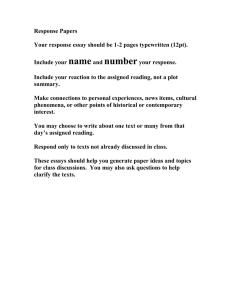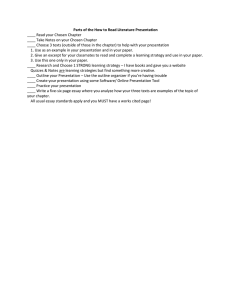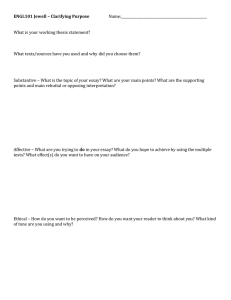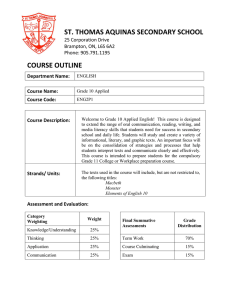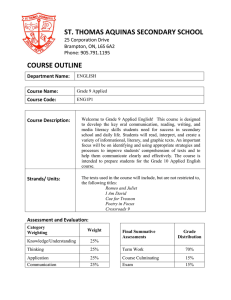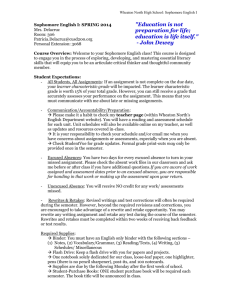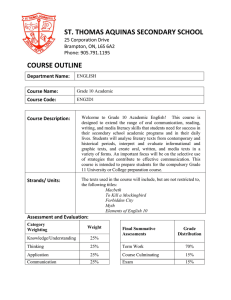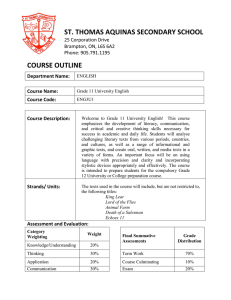Sophomore English I: 2015 - 2016 "Education is not preparation for life;
advertisement
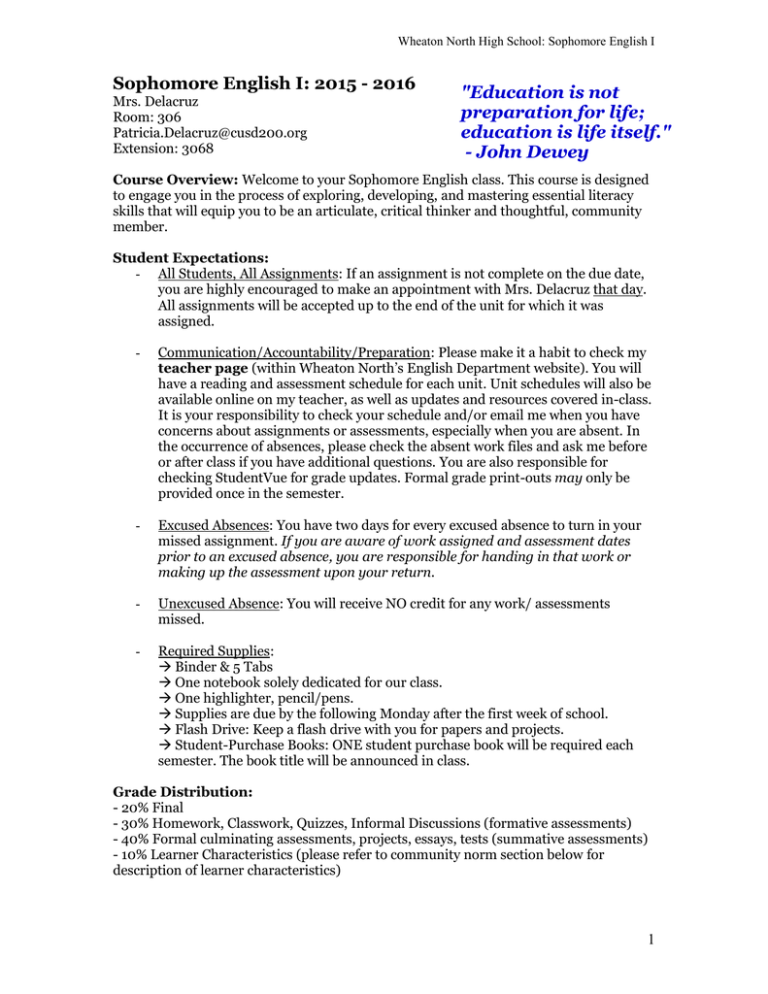
Wheaton North High School: Sophomore English I Sophomore English I: 2015 - 2016 Mrs. Delacruz Room: 306 Patricia.Delacruz@cusd200.org Extension: 3068 "Education is not preparation for life; education is life itself." - John Dewey Course Overview: Welcome to your Sophomore English class. This course is designed to engage you in the process of exploring, developing, and mastering essential literacy skills that will equip you to be an articulate, critical thinker and thoughtful, community member. Student Expectations: - All Students, All Assignments: If an assignment is not complete on the due date, you are highly encouraged to make an appointment with Mrs. Delacruz that day. All assignments will be accepted up to the end of the unit for which it was assigned. - Communication/Accountability/Preparation: Please make it a habit to check my teacher page (within Wheaton North’s English Department website). You will have a reading and assessment schedule for each unit. Unit schedules will also be available online on my teacher, as well as updates and resources covered in-class. It is your responsibility to check your schedule and/or email me when you have concerns about assignments or assessments, especially when you are absent. In the occurrence of absences, please check the absent work files and ask me before or after class if you have additional questions. You are also responsible for checking StudentVue for grade updates. Formal grade print-outs may only be provided once in the semester. - Excused Absences: You have two days for every excused absence to turn in your missed assignment. If you are aware of work assigned and assessment dates prior to an excused absence, you are responsible for handing in that work or making up the assessment upon your return. - Unexcused Absence: You will receive NO credit for any work/ assessments missed. - Required Supplies: Binder & 5 Tabs One notebook solely dedicated for our class. One highlighter, pencil/pens. Supplies are due by the following Monday after the first week of school. Flash Drive: Keep a flash drive with you for papers and projects. Student-Purchase Books: ONE student purchase book will be required each semester. The book title will be announced in class. Grade Distribution: - 20% Final - 30% Homework, Classwork, Quizzes, Informal Discussions (formative assessments) - 40% Formal culminating assessments, projects, essays, tests (summative assessments) - 10% Learner Characteristics (please refer to community norm section below for description of learner characteristics) 1 Wheaton North High School: Sophomore English I Community Norms: These norms define LEARNER CHARACTERISTICS. Our class will continue to define more learner characteristics as the semester progresses. - - - Presence: Your presence (mentally and physically) is essential to your success and our class community. You should be alert and attentive during our class time. Communication: As we work together this semester, we will be building a community. Ideally, this will be a healthy and collegial community. I encourage you to communicate with me if you have any questions, concerns, or thoughts that you may not have shared in class. I will always make time for us to communicate if you are in need of support. I also expect communication in the event of extended absences or unexpected circumstances that may impede your presence and progress in class. Communal Respect: Respect your peers, our classroom time, and me. You will receive one warning in a period. Any interruptive comments, talking with neighbors at unsuitable times, extraneous electronic device use, and standing up in class at inopportune times will warrant a warning. Beyond this one warning, you will receive a reflection essay assignment on the disruptive behavior and the ways in which you can learn from this behavior and its consequences. This essay must be a minimum of 300 words, typed in MLA format. This reflection essay will be due the following school day. Failure to submit this reflection essay may result in a detention, further communication with guardian(s) and/or a referral to the Dean’s office. Unit Outlines: Listed below are anticipated goals, activities, and texts for this 2015— 2016 school year. These elements are subject to moderate changes as this curriculum outline is a fluid document that will be influenced by the class community. Unit 1: The World and Me: Cultural Identity Culminating Assessment(s): Formal informative writing assignment and corresponding multi-media presentation that reflects the process of selection, organization, and analysis of one or multiple texts to support an exposition on an essential thematic question. Essential Thematic Questions: How does one’s cultural experience(s) contribute to an understanding of self? How does the examination of other cultures widen our perspective and/or inform who we are? Essential Skill-Based Questions: How do authors use language to reveal the purpose and tone of their writing? What is the relationship between purpose and medium (the author’s chosen vehicle of expression)? In what ways can we use medium to achieve a desired effect? What does a quality discussion look and feel like? Possible Texts: 2 Wheaton North High School: Sophomore English I Poems: “When I was Growing Up” by Nellie Wong, “America” by Claude McKay, “What Spain was Like” by Pablo Neruda. Informational Texts: “To Make America Great Again, We Need to Leave the Country,” Elliot Gerson; “Only Daughter,” Sandra Cisneros; “New Poll Dispels Myth About Muslim Americans,” Sally Steenland; “For Afghan Girl, Going to School Is Act of Bravery,” Melissa Block; other timely news from The Atlantic, The New York Times, The New Yorker. Novel: Life of Pi, Yann Martel. Media: TED Talks; Life of Pi. Unit 2: Breaking the Cycle Culminating Assessment(s): Formal writing assignment that reflects the process of selection, organization, and analysis of one or multiple texts and the application of this analysis to support an argument on a thematic question of the unit. Essential Thematic Questions: What does it mean to “break the cycle,” and why might a person choose to do so? In what situations do individuals question authority? How does one maintain a sense of self if personal values are threatened? Essential Skills-Based Questions: How does an author use various methods of direct and indirect characterization to develop a theme over the course of a work? How does one analyze the representation of a subject or theme in various spoken formats (including what is emphasized or absent in each document/speech, use of language, connotations, etc.)? How can students initiate and participate effectively in a range of collaborative discussions with diverse building on others’ ideas and expressing their own clearly and persuasively? Possible Texts: Poems: “Still I Rise,” Maya Angelou; “We Real Cool,” Gwendolyn Brooks; Short Stories: “Indian Education,” Sherman Alexie. Novels: Fahrenheit 451, Ray Bradbury; Anthem, Ayn Rand; The Book Thief, Markus Zusak; The Hunger Games, Suzanne Collins; The Glass Castle, Jeannette Walls; The Help, Kathryn Stockett Informational Texts: “Why I am opposed to the war in Vietnam” Transcript MLK; “Shakespeare’s Sister”; Zach Wahls Speaks About Family http://www.youtube.com/watch?v=FSQQK2Vuf9Q Art: Select pieces from The Art Institute of Chicago. Media: The Help, Minority Report. Unit 3: Growing up in a Digital Age Culminating Assessment(s): Formal argumentative essay that reflects the process of selection, organization, and analysis of researched texts and the application of this analysis to support an argument on a thematic question of the unit. 3 Wheaton North High School: Sophomore English I Essential Thematic Questions: How does growing up in a digital age influence how we think and act? Essential Skills-Based Questions: How does one present purpose-specific information using appropriate support, organization, and development to various audiences? How can an author use the concepts of ethos, pathos, and logos to strengthen his or her argument? Possible Texts: Informational Texts: “As Technology Gets Better, Will Society Get Worse?” by Tim Wu; “Can Twitter Boost Literacy”; “Khan Academy: the hype and the reality”; other timely texts concerning technology from the The Atlantic, The New York Times, The New Yorker. Cartoons and Images: “Apple Fans Lining Up for iHand”, the Onion; “New Constitution of U.S. Ratified”, the Onion; “135,817 Facebook friends…and not one of them will cosign a loan for you?”, Randy Glasergen; select images satirizing technology from The Onion. Media: “Making Change: Change.org”, John Steward; TED Talks. ********************************************************************************* I have reviewed the course syllabus with my student and he/she understands the classroom expectations and policies. _________________ (Guardian’s printed name) _______________________ (Guardian’s signature) I have read the course syllabus and classroom policies. I am aware of my responsibilities and will seek clarification when I am unsure of expectations. ___________________ (Student’s printed name) ________________________ (Student’s signature) 4
